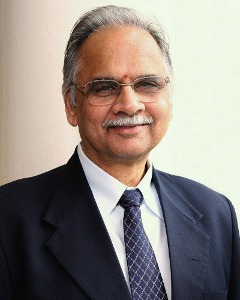Nyquist Lecture
Tuesday, November 1, 8:30 AM
Four Decades of Control: A Journey of Reinventions
Prof. M. Vidyasagar
Cecil & Ida Green Chair in Systems Biology Science
Erik Jonsson School of Engineering & Computer Science
The University of Texas at Dallas
Download Nyquist 2011 lecture delivered by Prof. Vidyasagar on November 1, 2011 : Download
From the time I got my Ph.D. in 1969, more than four decades ago, control systems as a field has changed beyond recognition — or has it? Yes, I used a slide rule as an undergraduate and now we solve huge problems our laptops, but these technological advances have not obviated the need to THINK about problems in the abstract. Over the years, we see persons trained in control systems making important contributions to several other fields, such as energy, robotics, automotive, and biology. I myself am now totally engrossed with the biology of cancer, and how we as a community can help. On the other hand, we rarely see persons moving into control from other fields. Why is that?
“Modern” control theory is supposed to have started around 1960 with the state space approach. How should “post-modern control theory” look? My main thesis is that SYSTEMS concepts such as optimality, robustness, limits on achievable performance etc. are all fundamental and will remain with us more or less forever, whereas specific CONTROL strategies such as the linear quadratic regulator, Kalman filter, H-infinity control etc. tend to get “commoditized” over time. I will mention some success stories from the past, and suggest how we should train our graduate students in future years. Most important, based on personal experience, I will suggest that WE need to go looking for applications — they will not come looking for us.
Mathukumalli Vidyasagar was born in Guntur, India on September 29, 1947. He received the B.S., M.S. and Ph.D. degrees in electrical engineering from the University of Wisconsin in Madison, in 1965, 1967 and 1969 respectively. Between 1969 and 1989, he was a Professor of Electrical Engineering at various universities in the USA and Canada. His last overseas job was with the University of Waterloo, Waterloo, ON, Canada, where he served between 1980 and 1989. In 1989 he returned to India as the Director of the newly created Centre for Artificial Intelligence and Robotics (CAIR) in Bangalore, under the Ministry of Defence, Government of India. Between 1989 and 2000, he built up CAIR into a leading research laboratory with about 40 scientists and a total of about 85 persons, working in areas such as flight control, robotics, neural networks, and image processing. In 2000 he moved to the Indian private sector as an Executive Vice President of India’s largest software company, Tata Consultancy Services. In the city of Hyderabad, he created the Advanced Technology Center, an industrial R&D laboratory of around 80 engineers, working in areas such as computational biology, quantitative finance, e-security, identity management, and open source software to support Indian languages. In 2009 he retired from TCS at the age of 62, and joined the Erik Jonsson School of Engineering & Computer Science at the University of Texas at Dallas, as a Cecil & Ida Green Chair in Systems Biology Science. In March 2010 he was named as the Founding Head of the newly created Bioengineering Department. His current research interests are in the application of stochastic processes and stochastic modeling to problems in computational biology, control systems and quantitative finance.


